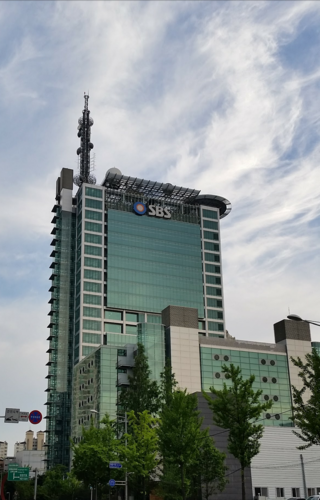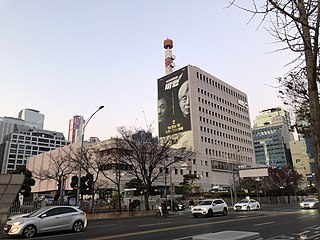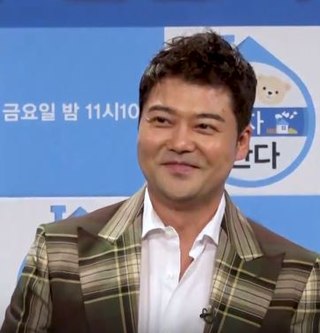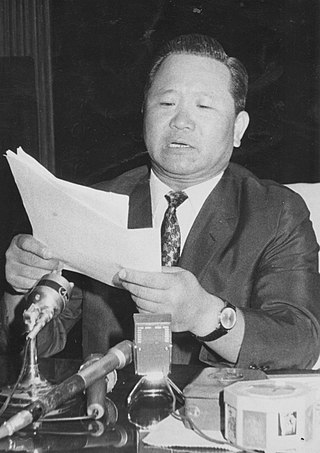
Seoul Broadcasting System (SBS) is one of the leading South Korean television and radio broadcasters. The broadcaster legally became known as SBS in March 2000, changing its corporate name from Seoul Broadcasting System. Its flagship terrestrial television station SBS TV broadcasts as channel 6 for digital and cable.

Infinite Challenge is a South Korean television entertainment program, distributed and syndicated by MBC, that ran from 2005 to 2018.

Fireworks is a South Korean television series produced and broadcast by SBS from 2 February to 18 May 2000.

Yu In-chon is a South Korean actor and the current Minister of Culture, Sports and Tourism under president Yoon Suk Yeol, the position which he previously held under president Lee Myung-bak. He was formerly the Special Presidential Adviser on Culture and Sports.

Kim Tae-ho is a South Korean television director.

Manmin Central Church is a Protestant Christian church founded in Seoul, South Korea in 1982 by Jaerock Lee and is one of the largest churches in Korea. Manmin means ‘all creation; all the nations; all the people.’

Radio Star is a South Korean talk show hosted by Kim Gook-jin, Kim Gu-ra, Yoo Se-yoon and Jang Do-yeon. It airs on MBC on Wednesdays at 10:30(KST). The first episode aired on May 30, 2007, making it one of the longest-running talk shows in the country.

JTBC is a South Korean nationwide pay television network. Its primary shareholder is JoongAng Holdings, with a 25% stake. It was launched on 1 December 2011. JTBC is a generalist channel, with programming consisting of television series, variety shows, and news broadcasting; its news division is held in similar regard to the three main terrestrial networks in South Korea.
Channel A Corporation, known as Channel A, is a nationwide generalist cable TV network and broadcasting company in South Korea. The company's largest shareholder is Dong-A Media Group (DAMG), which consists of 12 affiliate companies including The Dong-a Ilbo. Channel A was launched on 1 December 2011. Channel A's management philosophy is 'Open & Creative' and the company slogan is 'Channel A, A Canvas that Holds Your Dreams.' JaeHo Kim is the chief executive officer.

KBS 2TV is a South Korean free-to-air television channel launched on 1 December 1980 and owned by Korean Broadcasting System. In contrast to KBS1, the channel specializes primarily in entertainment.

Tongyang Broadcasting Company was a South Korean commercial television station which was merged by the government with KBS. It was owned by the Samsung Group founder Lee Byung-chul and was a sister company to the JoongAng Ilbo.

Jun Hyun-moo is a South Korean host and television personality. Before Before becoming a host, he was a KBS news anchor and radio announcer.

I Live Alone, also known as Home Alone, is a South Korean entertainment program distributed and syndicated by MBC every Friday at 23:00 (KST).

Kim Sung-joo is a South Korean television host and a former announcer. A former sports broadcaster and presenter, he became known to the wider public as a variety show host and for his stint on the reality-variety show Dad! Where Are We Going?.
Music programs of South Korea are broadcast weekly, with different artists performing on the shows to promote their music.
Kim Yong-man is a South Korean comedian. He is currently signed with the entertainment agency, FNC Entertainment.

Kim Hyong-uk was a South Korean brigadier general who served as director of the Korean Central Intelligence Agency from 1963 to 1969.

My Secret Terrius is a 2018 South Korean television series starring So Ji-sub, Jung In-sun, Son Ho-jun and Im Se-mi. It was aired on MBC from September 27 to November 15, 2018 on Wednesdays and Thursdays at 21:55 (KST).
The Mnet vote manipulation investigation was a South Korean entertainment scandal involving electoral fraud in several reality competition series produced and broadcast by the television channel Mnet. The incident primarily involves the Produce 101 series and Idol School, which were intended to create K-pop groups with members selected by audience vote.
The Busan Munhwa Broadcasting Corporation is MBC's local branch for the city of Busan. The first private radio station in South Korea, the branch operates radio and television under the HLKU callsign.















